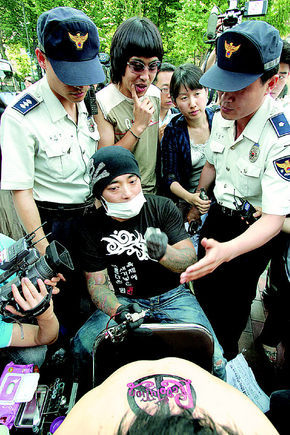My girlfriend, at 27, is finally ready to tattoo her pale and virgin skin. This in itself isn’t particularly interesting since, I’m sure if you looked at it statistically, it’s likely that every 2.3 seconds someone somewhere is popping their tattoo cherry. What’s interesting about her plunge is that she’s currently living and working in Busan, South Korea.
In South Korea, tattooing is considered a medical procedure and it is illegal to give anyone a tattoo – for pay or otherwise – without a medical license. Unsurprisingly, less than ten doctors in the country perform tattoos on their patients and every single one of those ten limit their tattooing to tattooed makeup – natural-looking tattooed eyebrows, eyeliner, lip liner and the like.
Non-M.D. tattoo artists caught tattooing are often arrested,  fined, convicted and can face sentences as severe as lifetime imprisonment (this is a terrific example of the punishment not befitting the crime). Tattooing itself is not illegal in the country per se but in 1992 a judge set precedence when he convicted one tattooist with practicing medicine without a license, having nothing else to hold to the guy. That verdict laid the groundwork for the climate and attitude we find in the South Korean legal system towards tattoo artists today.
fined, convicted and can face sentences as severe as lifetime imprisonment (this is a terrific example of the punishment not befitting the crime). Tattooing itself is not illegal in the country per se but in 1992 a judge set precedence when he convicted one tattooist with practicing medicine without a license, having nothing else to hold to the guy. That verdict laid the groundwork for the climate and attitude we find in the South Korean legal system towards tattoo artists today.
Part of the reason the 1992 verdict has held up is the country’s general attitude towards the practice. During the Chosun Dynasty, thieves and criminals were branded with a big ol’ tattoo on their foreheads. Korean gang members have also adopted the practice of the Japanese yakuza, getting tattoos to symbolize gang unity and loyalty, fostering this pervasive belief that tattoos were solely things of criminals and gang members and therefore are not to be sported by the law-abiding members of society for fear of affiliation.
I’m sure you’re not at all shocked to hear that Korea’s suppression of the tattoo community and the general public’s disdain for it hasn’t stopped a few edgy Koreans from wanting tattoos and artists from performing them. The taboo has given them a dangerous, black-market appeal. Tattooists have been forced underground – into back rooms, basements, backyards, etc. – making it difficult to provide the necessary sterilized, hygienic and safe conditions to prevent the transfer of dangerous diseases and infections. The laws have also driven the cost of receiving a tattoo sky-high – in the thousands of dollars – as artists don’t want to put their asses on the line for little pay.
Earlier this year lawyer Moon Kun-Young spoke out, calling Korea’s regulation of tattoos unreasonable. “There is no other country in the world except South Korea where tattooing is subject to a heavy sentence,” she told the South Korean press. Kun-Young also teamed up with a young Korean tattoo artist for a protest march across the country as well as for an exhibit in the National Assembly building in Seoul, displaying photos of people adorning beautiful tattoos. Their goal was to spread awareness, “advance freedom of expression,” and change the country’s traditional attitudes towards tattoos so that they become more accepted and less condemned.
It seems to have worked. The laws will be changed shortly and Koreans, including my friend Nat (who will soon be the proud wearer of four Egyptian cartouches), will be able to walk into an open, sanitary tattoo shop and get a tattoo from a reputable artist without fear of arrest or Hepatitis.
The country’s ridiculous laws of technicality drove a few tattoo artists serious about their art out of the country and some have returned (including Nat’s chosen artist) to their homeland armed with years of experience, having been forced to perfect their craft in various overseas countries.